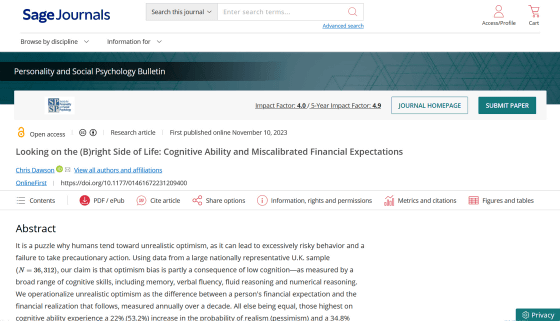Research shows that people who are optimistic about economic issues have lower cognitive ability

Looking on the (B)right Side of Life: Cognitive Ability and Miscalibrated Financial Expectations - Chris Dawson, 2023
https://journals.sagepub.com/doi/10.1177/01461672231209400

Optimistic thinking linked with lower cognitive abilities - new research
https://www.bath.ac.uk/announcements/optimistic-thinking-linked-with-lower-cognitive-abilities-new-research/
Financial optimism linked to lower cognitive ability
https://www.psypost.org/2023/12/financial-optimism-linked-to-lower-cognitive-ability-214927
Previous research has shown that humans tend to overestimate future income and life expectancy, while underestimating negative events such as divorce and poor health. In order to live a better life, it should be helpful to view things objectively, but people are still biased towards optimism.
Dr Christopher Dawson , Associate Professor of Economics at the University of Bath's School of Management, said: 'People receive constant feedback from their environment, and despite being able to know the realistic probabilities of good and bad events. 'I've long been interested in why people are so much more optimistic about the future. From this perspective, it seemed to me that cognitive biases like optimism were related to cognitive abilities.' states.

Dawson and colleagues looked at the Understanding Society dataset, an annual survey of 36,312 people across the UK between 2009 and 2021, to find out whether optimism is associated with cognitive performance. I analyzed it. Participants were asked about their economic outlook for the coming year and answered whether they thought their lives would be better, worse, or about the same as this year.
The researchers compared these expectations to actual changes in household income, adjusted for inflation and household size, and assigned participants to groups ranging from extreme pessimism to extreme optimism. I did. In addition, the subjects were also evaluated on various cognitive abilities such as memory, language ability, calculation, and reasoning through various tasks.
The analysis found that people with high cognitive abilities were 35% less likely to be 'extremely optimistic' about their financial prospects and 22% more likely to be 'realistic' about their financial prospects. It turns out that. Furthermore, this relationship held true even after accounting for factors such as educational attainment, suggesting that the relationship between cognitive ability and economic optimism is not simply a reflection of whether one has higher education. .
The influence of optimism was particularly strong in decisions about major financial issues such as employment, investment, and savings, and in choices involving uncertainty. Dawson says, 'Unrealistic and optimistic economic expectations can lead to overspending and borrowing and insufficient savings. They can also lead to over-entering businesses and subsequent failure. The probability of success is very small, but optimists always think there is a chance and start businesses that are destined to fail.'

The reason why people with lower cognitive ability are more optimistic may be that accurately predicting the future is a difficult cognitive task, and people with lower cognitive ability are more likely to make prediction errors. That's what he said.
There is also the idea that humans are hardwired to be optimistic, and that people with higher cognitive abilities are better able to cope with this innate response when making important financial decisions. Based on
'Unrealistic optimism is one of the most pervasive human traits, and research shows that we consistently underestimate the negative and overestimate the positive,' Dawson said. 'The concept of positive thinking is almost indisputably embedded in our culture, and it would be healthy to reconsider this belief.'

Related Posts:
in Science, Posted by log1h_ik







